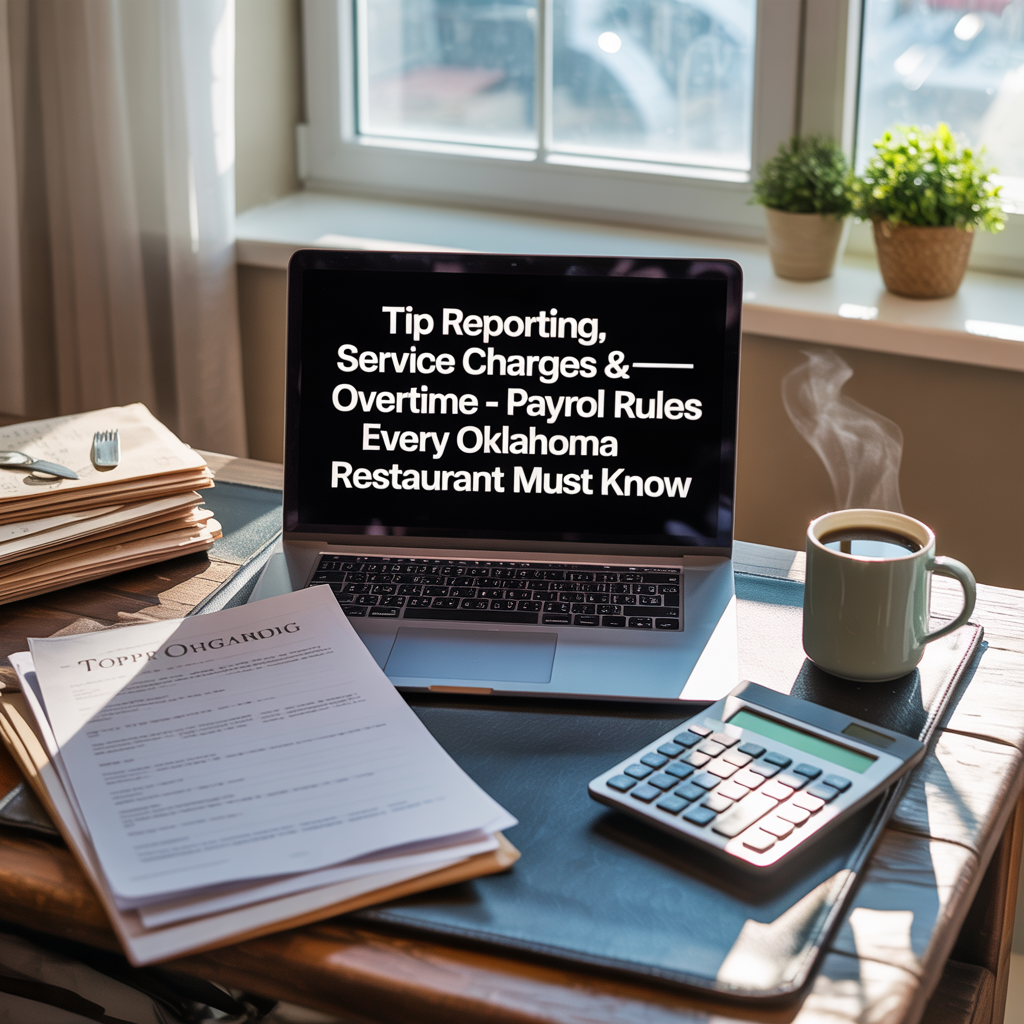Tip Reporting, Service Charges & Overtime – Payroll Rules Every Oklahoma Restaurant Must Know

Running a restaurant or bar in Oklahoma means managing more than just great food and service — it means staying compliant with tip reporting laws, overtime rules, and service charge classifications that can trip up even experienced operators.
In this post, we break down the must-know payroll rules for Oklahoma hospitality businesses — with real-world tips to avoid audits, wage disputes, and IRS penalties.
1. Tip Reporting: It’s the Law — Not a Suggestion
Tipped employees must report all tips over $20 per month, and employers are responsible for:
- Collecting and recording tip amounts
- Withholding Social Security and Medicare (FICA) taxes
- Reporting tips on quarterly Form 941 filings
- Issuing W-2s that reflect total wages, including tips
Common mistake: Only reporting credit card tips.
Fix: Require employees to report cash tips daily or weekly — and use a payroll system that tracks total reported tips.
2. Tip Credit in Oklahoma: What You Can and Can’t Do
Oklahoma follows federal rules allowing restaurants to pay tipped employees as little as $2.13/hour, so long as:
- Tips bring the employee’s total pay to at least $7.25/hour
- You provide written notice of tip credit use
- You track tips and wages accurately each pay period
- You make up the difference if tips fall short
Illegal practices:
- Failing to notify employees
- Taking the tip credit while requiring tip pooling with management
- Not making up shortfalls when tips don’t meet minimum wage
3. Tip Pooling: Who Can Participate?
Tip pooling is legal in Oklahoma if handled correctly.
You can require tipped employees to share tips with:
- Bussers
- Food runners
- Hosts (if not acting in a supervisory role)
You cannot require tip pooling with:
- Managers or owners
- Kitchen staff (unless you don’t take the tip credit)
- Employees not directly involved in service
Violating tip pooling rules can result in:
- Back pay claims
- Loss of tip credit
- DOL penalties and interest
4. Service Charges vs. Tips – Know the Difference
If your restaurant adds a fixed gratuity or service charge (e.g. 18% for large parties), the IRS considers that a wage, not a tip.
That means:
- You must withhold taxes from it
- It must be included in the employee’s W-2
- It doesn’t count toward the tip credit
- It must be processed through payroll like any other wage
Bottom line:
- Tips = voluntary, controlled by the customer
- Service charges = automatic, controlled by the employer
Don’t confuse the two — or your payroll reporting will be wrong.
5. Dual Jobs = Dual Pay Rates
If a bartender also washes dishes, or a server also acts as a shift lead:
- You must track hours separately
- You may not apply the tipped rate to the non-tipped work
- If one role is supervisory or salaried, FLSA exemptions may apply
Use a payroll system that allows multi-rate tracking to stay compliant.
6. Overtime Must Be Paid Weekly — No Averaging Allowed
Overtime must be paid:
- At 1.5x the regular rate
- For any hours worked over 40 in a week
- Even if the employee worked fewer hours the week before
- Even if you run biweekly payroll
Illegal practice: Averaging 45 hours one week and 35 the next and skipping overtime
Fix: Run overtime reports weekly and pay accordingly — even for tipped workers
7. Time Tracking Is Required — Not Optional
FLSA and Oklahoma law require you to:
- Track clock-in and clock-out times for every employee
- Maintain records for at least 3 years
- Provide access to time records if requested
If you're using pen-and-paper timesheets or unverified manager entries, you’re at risk of:
- Inaccurate overtime
- Wage claims
- Lost records in the event of a labor audit
Check out our payroll compliance checklist for Oklahoma businesses »
8. Tip Reporting Is Required on W-2s
At year-end, each tipped employee’s W-2 must reflect:
- Total wages (including tips)
- Allocated tips (if any)
- Withholding on both wages and tips
- Medicare and Social Security contributions
Failure to report tips on W-2s leads to:
- Incorrect income reporting
- IRS notices to your business
- FICA underpayment issues
We help restaurants automate this and ensure every W-2 is audit-proof.
FAQs – Tip Reporting & Payroll for Oklahoma Restaurants
Q: Can I just 1099 a server if they’re part-time?
No. Servers are employees, not contractors. You must run payroll and issue a W-2.
Q: Can I average hours across two weeks to avoid overtime?
No. FLSA requires overtime to be calculated and paid weekly.
Q: Are tip-out amounts considered taxable?
Yes. All tip-outs must be reported, taxed, and included on W-2s.
Q: Do service charges count toward the tip credit?
No. Service charges are wages — they don’t qualify as tips under IRS rules.
Q: What if my payroll system doesn’t track tips and hours separately?
It’s time to upgrade. We offer CPA-backed payroll systems with full tip and role tracking.
Oklahoma Restaurant Payroll Built to Stay Compliant
At Boulanger CPA, we serve restaurants, bars, cafés, and venues across Oklahoma. We help you run:
- Fully compliant tip reporting
- Multi-role pay tracking
- Automated time and overtime calculations
- FICA, IRS, OTC, and W-2 compliance
- Secure CPA-reviewed payroll every cycle
Schedule a Free Restaurant Payroll Consultation
See Per-Employee Pricing

Marc Boulanger
Marc views his accounting business as an extension of his family. And while he holds a Bachelor of Arts in Business Administration and Accounting and a Masters of Science in Accounting, he values traveling around the country with his wife of 30 years and 5 kids, Marc learned that communication is the key to effective team work.


